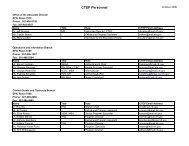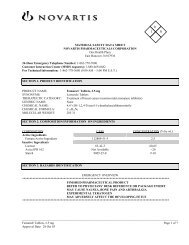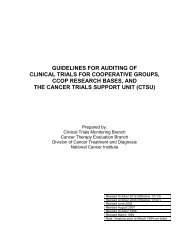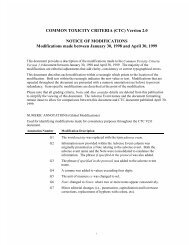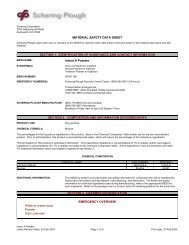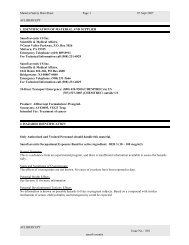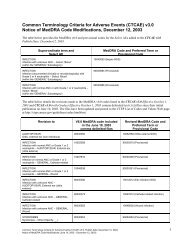NCI National Clinical Trials Network (NCTN) Program Guidelines
NCI National Clinical Trials Network (NCTN) Program Guidelines
NCI National Clinical Trials Network (NCTN) Program Guidelines
You also want an ePaper? Increase the reach of your titles
YUMPU automatically turns print PDFs into web optimized ePapers that Google loves.
PART 1: Overview of <strong>NCTN</strong> <strong>Program</strong> Section IV – Terms/Conditions of Award – <strong>NCI</strong>/DCTD Responsibilities<br />
3.1 Proposal Review<br />
General Information: Study proposals for treatment or advanced imaging clinical trials are evaluated as<br />
either Letters of Intent (LOI) or Concepts depending on the whether the proposal is<br />
reviewed/evaluated by the <strong>NCI</strong>/DCTD Cancer Therapy Evaluation <strong>Program</strong> (CTEP) Protocol Review<br />
Committee (PRC) or by an <strong>NCI</strong> Scientific Steering Committee (i.e., disease-specific or clinical imaging<br />
Steering Committees) as described below. An illustration of the study review/evaluation process for<br />
<strong>NCTN</strong> study proposals and associated information is also provided in Part 4 – Appendices - Section III of<br />
these <strong>Guidelines</strong>. The terms <strong>NCI</strong>/DCTD PRC and CTEP PRC are used interchangeably in these<br />
<strong>Guidelines</strong>.<br />
<strong>Trials</strong> proposals prioritized by <strong>NCI</strong> Scientific Steering Committee (SSC) undergo expedited review by<br />
CTEP before final approval is given in order to ensure significant safety, feasibility, and regulatory issues<br />
are adequately addressed, including ensuring that there are adequate resources available for the trial<br />
given the resource allocation constraints for the disease area, and to prevent duplication. However, it<br />
is expected that this final review/approval by CTEP can be accomplished in an expedited manner in<br />
most cases as designated <strong>NCI</strong>/DCTD staff participate as full members on the various <strong>NCI</strong> and significant<br />
issues in these areas are incorporated into the evaluation/prioritization discussion.<br />
<strong>NCI</strong>/DCTD staff (i.e., 3 representatives - one representative from BRB, the Lead <strong>NCTN</strong> <strong>Program</strong> Director<br />
or his/her designee, and the physician liaison from the <strong>Clinical</strong> Investigations Branch or the Cancer<br />
Imaging <strong>Program</strong>) are full members on the disease-specific and <strong>Clinical</strong> Imaging Scientific Steering<br />
Committees. The <strong>Clinical</strong> Investigations Branch physician in the related disease area for the diseasespecific<br />
Steering Committee (or Cancer Imaging <strong>Program</strong> representative for the <strong>Clinical</strong> Imaging<br />
Steering Committee) have special responsibilities on the <strong>NCI</strong> SSCs, including developing meeting<br />
agendas with the SSCs co-Chairs, preparing the Consensus Evaluations for proposals evaluated by the<br />
committees, and working with the SSC Co-Chairs on the scientific direction of the committee.<br />
Any change in the policies and procedures of the <strong>NCI</strong> SSCs related to composition of committee<br />
membership, conflict of interest, and evaluation/prioritization procedures for <strong>NCTN</strong> clinical trials<br />
requires review and approval by the Lead <strong>NCTN</strong> <strong>Program</strong> Director and the Associate Director, CTEP,<br />
DCTD/<strong>NCI</strong> to ensure that procedures are consistent with the intent of the <strong>NCTN</strong> <strong>Program</strong> and the<br />
Terms and Conditions of Award under the Cooperative Agreements for all key components of the <strong>NCTN</strong><br />
<strong>Program</strong>.<br />
Proposal Review Process Based on Type of Study: Review of study proposals for the <strong>NCTN</strong> <strong>Program</strong> is<br />
based on the type of study (including intervention study, non-intervention study, trial phase), IND<br />
status, patient population (adult vs. pediatric), and sample size. The review process based on these<br />
study attributes are described below.<br />
� All phase 1 trial proposals, pilot studies, and any trial proposal submitted by <strong>Network</strong> Group<br />
Operations Centers in response to mass solicitations or specific solicitations from the <strong>NCI</strong>/DCTD<br />
Cancer Therapy Evaluation <strong>Program</strong> (CTEP) are evaluated as LOIs by the CTEP’s PRC.<br />
� All phase 3, phase 2/3, and large phase 2 trial proposals (i.e., phase 2 trials requiring sample sizes<br />
of 100 patients or more) are first evaluated and prioritized by the appropriate <strong>NCI</strong> Scientific<br />
Steering Committee as Concepts with final expedited approval/disapproval by CTEP with<br />
consideration of the feasibility and resources available to the <strong>NCTN</strong> to conduct the study. (Note:<br />
This applies only when the study proposal is not part of a mass solicitation or other specific<br />
solicitation by <strong>NCI</strong>/DCTD or an adult pilot study).<br />
� All small phase 2 and phase 1/2 adult study proposals (i.e., trials requiring a total sample size of<br />
less than 100 patients) are evaluated as LOIs by the CTEP’s PRC. However, at CTEP’s discretion, if<br />
these trial proposals have total sample sizes close to 100 patients (i.e., in the low 90s to 100), CTEP<br />
Page 78 of 241



